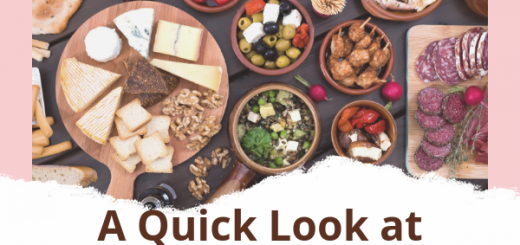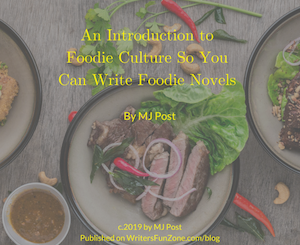What are Chefs Like? What Makes them Interesting? by MJ Post
 Let’s welcome back monthly columnist MJ Post as she shares with us “What are Chefs Like? What Makes them Interesting?” Enjoy!
Let’s welcome back monthly columnist MJ Post as she shares with us “What are Chefs Like? What Makes them Interesting?” Enjoy!
***
Hey, yiz! Welcome to the third of my ongoing series about writing food fiction.
In March 2019 I wrote about foodie culture, and in January’s column, I answered the question, why write a food novel anyway?
Now it’s time to talk about people who make very compelling characters — chefs.
OVERVIEW OF THE CHEF PROFESSION
First, let’s distinguish first between chefs and cooks.
Cooks are people who prepare recipes. Their training includes kitchen cleanliness and sanitation, plus basic food preparation, and the specific requirements of the dishes they make.
Chefs are more skilled than cooks. They are capable of crafting entire menus by putting their personal twists on dishes.
Many people with the title “chef” have been to culinary school, but the title doesn’t require that. There are no official or formal requirements, so a wide range of people carry the label.
If you are good enough to do what a chef does, you can call yourself by the title. Some chefs have had periods of working for more established masters to learn their skills. Others have just practiced and studied a lot on their own.
In summary, a chef is someone who, by various different means, has become capable of excellent food preparation and menu design.
Chefs have their own rankings within the industry. The titles can be confusing, and they aren’t that rigid. Here is a quick reference guide.
The larger the kitchen, and the more upscale the restaurant, the more these terms come into play.
The French!
Your local family restaurant doesn’t use all of them, or possibly any of them. The fact that most of the terms are in French tells you what you need to know: this system is based on the very formal and official structure used in fine French restaurants.
French food, you will recall, is often considered the best food in the world. They know what they’re doing in kitchens in France — or that’s what I hear.
Chef’s Roles
Chefs often have managerial roles, with varying skill levels. Some chefs advance to a level that moves them away from stovetops and ovens and into the backroom office. There they design menus, and then maintain quality standards for preparation by organizing and supervising the workers in the kitchen.
Those kitchen workers who are career-oriented are there getting the seasoning (pun intended) they need to rise into the roles their supervisors occupy, sometimes in the same restaurant, but more likely in another. Many lower-level chefs aspire to open their own restaurants.
The Restaurant Business
The restaurant business is a massive financial risk. Most restaurants fail. Real estate costs, food costs. Utilities, advertising, and payroll all add up to a huge overhead.
To make money, restaurants need to keep busy. They get most of their income by making profits on food and beverages.
To learn about the business and management aspects of a chef’s career, watch all the old episodes of Restaurant: Impossible and Kitchen Nightmares that you can find. They are staged dramas, but they feature solid and believable explanations of how the business works. (Other restaurant revenue, by the way, comes from catering and renting out the restaurant as a staffed event venue.)
CHEF PERSONALITIES
What are chefs like? Well, OK, I don’t hang out with them, but here’s what I can glean from my research, mostly by reading and watching TV.
- They are success-oriented and driven.
- They work long hours, and that is physically, mentally, and emotionally hard on them.
- They have highly individual styles and methodology developed through experience and experimentation.
- They consider that food preparation requires emotion and that it is possible to detect that emotion, without knowing or observing the chef at work, but by paying attention how food is prepared and even how it is plated.
- They struggle to make sufficient family time. Some may go without relationships or families because of their professional ambitions or they may devote too little time and energy to their loved ones.
- They require a high level of pride and confidence to succeed.
- They tend to specialize in certain cuisines or ingredient types but are not limited by those specializations. Culinary school, at least, teaches you a little of everything.
A chef who is distracted or dispirited will lose competence and will slip in areas like food quality, cleanliness, management skill, and inventory control. A chef who is lazy will wind up being fired, quitting, or failing.
All sorts of people go into the culinary profession. The only requirements to enter seem to be opportunity, interest, and the ability to get better through practice.
 Given that the profession is broadly open, it does seem to be good for several categories of people. It’s good for go-getter professional types with big dreams and ambitions. It’s also good for people who have made mistakes early in life (drugs, crime), are willing to work hard, and need a second chance.
Given that the profession is broadly open, it does seem to be good for several categories of people. It’s good for go-getter professional types with big dreams and ambitions. It’s also good for people who have made mistakes early in life (drugs, crime), are willing to work hard, and need a second chance.
Additionally, in recent years, the profession has come to be good for women, although this was not the case until the late 20th century (before which it was entirely male-dominated.)
Currently in the culinary field, women can occupy any and all roles if they have the right combination of luck, dedication, and skill.
Chefs Make Great Characters
I think you can see from all that I’ve shared: chefs make great characters. They can be put in all sorts of dramatic situations. They can face external threats (competition or bad luck in business) and they definitely have to deal with a lot of internal problems (fatigue, troubled personal life, heightened ambition, perfectionism, unfulfilled creative impulses.)
What would you do with your chef character? Comment below or contact me at my social media and let me know! I’d love to hear.
***
ABOUT THE AUTHOR
 MJ Post (pseudonym) is a Brooklyn high school teacher and writer from Queens, NY. Educated in the South with an attitude straight out of Bensonhurst and Bay Ridge, MJ writes contemporary new adult romance and romantic comedy with a multi-regional flavor. MJ is happily married.
MJ Post (pseudonym) is a Brooklyn high school teacher and writer from Queens, NY. Educated in the South with an attitude straight out of Bensonhurst and Bay Ridge, MJ writes contemporary new adult romance and romantic comedy with a multi-regional flavor. MJ is happily married.
MJ’s work includes five romance novellas with Mysti Parker, one solo romance novel, and under her real name, five novels and two nonfiction books as well as miscellaneous other collections.
MJ’s novel Chef Showdown: A Romance, two young chefs fall in love while competing on a reality TV cooking show under the watchful eye of the toughest judge imaginable. It will make you hungry for some love and some great food.
Amazon author page: https://www.amazon.com/MJ-Post/e/B074HX7TJK/
Facebook Readers’ group and street team: https://www.facebook.com/groups/432743907149227/
Facebook Author page: https://www.facebook.com/MJ-Post-Author-302156203319243/
Newsletter signup: http://eepurl.com/dyVqqz
Instagram: http://www.instagram.com/MJPostAuthor
Twitter: http://www.twitter.com/MJPostAuthor
***
WOMAN CHEF IMAGE CREDIT
Image by artistlike from Pixabay






